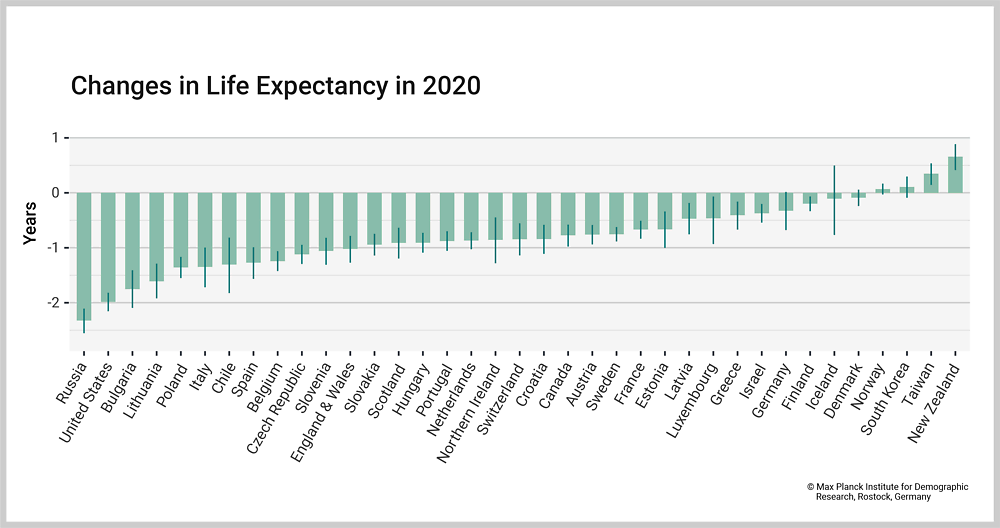November 04, 2021 | Press Release
Covid-19: Life Expectancy Decreased in Most High-Income Countries; Biggest Declines seen in Russia and the US

© iStockphoto.com/David Benito
The impact of the Covid-19 pandemic on mortality in 2020 is now quantified for 37 countries. Last year, life expectancy decreased in 31 of 37 studied countries. A total of about 28 million more years of life were lost than expected. And the years of life lost associated with the Covid-19 pandemic were more than five times higher than those associated with the seasonal influenza epidemic in 2015.
How did the pandemic influence changes in life expectancy and years of life lost in 2020? Dmitri Jdanov, Head of the Laboratory of Demographic Data at the Max Planck Institute for Demographic Research (MPIDR) in Rostock, Germany and colleagues from the Universities of Oxford and Cambridge in the U.K. answered this question for 37 upper-middle- and high-income countries with reliable and complete mortality data.
“For this study we compared the observed life expectancy and years of life lost in 2020 with those that would be expected based on historical trends from 2005 to 2019”, says Dmitri Jdanov. The study was published in the journal BMJ.
In New Zealand, Taiwan and Norway the Life Expectancy Increased
The team of researchers found that life expectancy for men and women decreased in 31 of 37 countries studied. In New Zealand, Taiwan, and Norway there was a gain in life expectancy in 2020. In Denmark, Iceland, and South Korea no evidence was found of a change in life expectancy.
Life expectancy decreased the most for men in Russia with a reduction of 2.33 years and women in Russia lost 2.14 years. The United States came in second with men losing 2.27 years and women 1.61 years of life expectancy. In Bulgaria men lost 1.96 years and women 1.37 years of life expectancy in 2020.
Life expectancy is an indication of how long on average people can expect to live if the circumstances of that year, expressed in the demographic metric of age specific mortality rates, remain constant for the rest of their life.

The figure shows changes in life expectancy for men and women combined. © MPIDR
Download figure (PNG File, 310 kB)
Men Lost 17.3 Million Years of Life More Than Expected; Women lost 10.8 Million
In the 31 countries with a decrease in life expectancy, more than 222 million years of life were lost in 2020. That is 28.1 million years of life lost more than expected. That includes 17.3 million excess years of life lost for men and 10.8 million in women. These excess years of life lost were more than five times higher than those associated with the seasonal influenza epidemic in 2015, Europe’s most severe flu epidemic since 2005.
Years of life lost is an estimate of the average years a person would have lived if they had not died prematurely. When people die at an older age, they lose fewer years of remaining life than younger people.
“Although using excess deaths has been considered the ideal method for measuring the impact of the pandemic, this metric does not consider age at death”, says Dmitri Jdanov. The metric of years of life lost considers the age distributions of mortality by giving greater weights to deaths that occur at younger ages.
Method Captures Both Direct and Indirect Effects of the Pandemic on Mortality
The team of researchers used annual all-cause mortality data from the Human Mortality Database for the years 2005 to 2020 that was harmonized and disaggregated by age and sex. Reduction in life expectancy was estimated as the difference between observed and expected life expectancy in 2020. Excess years of life lost were estimated as the difference between the observed and expected years of life lost in 2020.
“That method captures both the direct effects - deaths from Covid-19 - and the indirect effects - deaths from all other causes - of the pandemic and associated policy measures”, says Dmitri Jdanov.
How This Paper Compares to Earlier Papers by MPIDR-Researchers
A recent study by MPIDR-Researcher Jonas Schöley and colleagues examined changes in life expectancy between 2019 and 2020 in 29 countries and provided important information on differences between countries, including the best and the worst performers. However, this study was based on preliminary death statistics for reported countries and did not include data from the eight additional countries included in this study.
A study by MPIDR-Director Mikko Myrskylä from February 2021 estimated 20.5 million years of life lost in 81 countries based on projected deaths with Covid-19. In contrast, this study estimated 28.1 million years of life lost in only 31 countries. “These findings suggest a substantial underestimation of the overall impact on premature mortality if the estimates are based solely on deaths from Covid-19, when the estimation of years of life lost uses country-specific life tables, or both”, says Dmitri Jdanov.
“Our finding of comparable or lower than expected years of life lost in 2020 in six countries could be attributed to the successful pandemic mitigation policies of these countries, including evidence-based public health interventions”, says Dmitri Jdanov. He adds: “As of November 2021, the Covid-19 pandemic is not yet over, and therefore future studies will be needed to estimate the long-term burden of the pandemic.”
Original Publication
Islam, N., Jdanov, D.A., Shkolnikov, V.M., Khunti, K., Kawachi, I., White, M., Lewington, S., Lacey, B.: Effects of covid-19 pandemic on life expectancy and premature mortality in 2020: time series analysis in 37 countries. BMJ (2021). DOI: 10.1136/bmj-2021-066768
Authors and Affiliations
Nazrul Islam, Clinical Trial Service Unit and Epidemiological Studies Unit (CTSU), Nuffield Department of Population Health, Big Data Institute, University of Oxford
Dmitri A Jdanov, Max Planck Institute for Demographic Research, Rostock; International Laboratory for Population and Health, National Research University Higher School of Economics, Moscow
Vladimir M Shkolnikov, Max Planck Institute for Demographic Research, Rostock; International Laboratory for Population and Health, National Research University Higher School of Economics, Moscow
Kamlesh Khunti, Diabetes Research Centre, University of Leicester, Leicester; NIHR Applied Research Collaboration–East Midlands, Leicester General Hospital, Leicester
Ichiro Kawachi, Department of Social and Behavioral Sciences, Harvard T.H. Chan School of Public Health, Harvard University, Boston
Martin White, MRC Epidemiology Unit, University of Cambridge, Cambridge
Sarah Lewington, Clinical Trial Service Unit and Epidemiological Studies Unit (CTSU), Nuffield Department of Population Health, Big Data Institute, University of Oxford; MRC Population Health Research Unit, Nuffield Department of Population Health, University of Oxford
Ben Lacey, Clinical Trial Service Unit and Epidemiological Studies Unit (CTSU), Nuffield Department of Population Health, Big Data Institute, University of Oxford